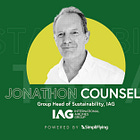#Sustainability20: Finnair bets on sustainable fuel progress but pushes back carbon-neutrality target date & more
Weekly round-up - 01/11/24
Each Friday, we publish a round-up of the 20 most important stories on sustainable aviation. You can see previous editions of #Sustainability20 here.
Industry Updates
Finnair has extended its carbon neutrality target to 2050, aligning with industry standards whilst securing validation for short-term plans to reduce unit emissions by 2033.
RMI has purchased SAF certificates from World Energy, aiming to reduce emissions by 954 metric tonnes whilst supporting industry decarbonisation efforts.
Air New Zealand's feasibility study has revealed locally produced SAF from woody waste could meet a quarter of domestic flight requirements.
SAS has demonstrated operational excellence in the TAC challenge, emphasising sustainability innovations whilst celebrating its seventieth anniversary of pioneering polar routes.
ICAO's Secretary General has called for unprecedented collaboration to achieve net-zero emissions by 2050, highlighting SAF as crucial for transformation.
CLIMATE WATCH: Climate crisis caused half of European heat deaths in 2022, says study - The Guardian
Research has revealed climate breakdown caused over half of Europe's 68,000 heat-related deaths in 2022, disproportionately affecting women and southern Europeans.
Infrastructure and operational efficiencies
Southwest Airlines has introduced bamboo cups and wooden stir sticks, aiming to eliminate single-use plastics from inflight service by 2030.
Airlines have discussed sustainable in-flight service challenges at IFSA Global EXPO, revealing complex operational, financial and environmental trade-offs in pursuing greener operations.
Hawaii Seaglider Initiative has partnered with Alaska Airlines to introduce electric inter-island transport, promising cheaper, cleaner travel alternatives to conventional flights.
Collins Aerospace has completed prototype development for high-voltage power distribution components, advancing hybrid-electric propulsion systems through the Clean Aviation SWITCH project.
AirAsia has implemented new ground support technology at Kuala Lumpur International Airport, reducing carbon emissions through innovative Combo Units for aircraft power needs.
The global air cargo industry is advancing towards net-zero emissions by 2050 through SAF adoption, technological innovations and enhanced airport infrastructure whilst maintaining operational efficiency.
Sustainable Aviation Fuel (SAF)
Montana Renewables has delivered SAF to Detroit Metropolitan Airport, partnering with Delta Airlines whilst pioneering camelina oil as feedstock.
Vueling has collaborated with Seduco-Wenergy to develop SAF from agricultural waste, utilising pig farm slurry and Guayule crops.
EVA Air has partnered with Airbus to accelerate SAF adoption, coinciding with orders for A350-1000 and A321neo aircraft.
Malaysia has announced Petronas's collaboration with palm oil producers for SAF production, despite Western concerns about environmental impact.
New technology: Electric and Hydrogen
BluJ Aerospace has demonstrated India's largest privately developed electric aircraft, planning hydrogen-powered cargo flights by 2026 and passenger services by 2030.
Sugar Land and Wisk Aero have partnered to establish vertiport facilities for autonomous electric aircraft operations in greater Houston.
Beyond Aero has secured £20 million in Series A funding for hydrogen-propelled electric aviation, having achieved France's first manned hydrogen-electric flight.
Eve has obtained a £50 million loan from Citibank for electric aircraft development, strengthening its position in vertical takeoff vehicle manufacturing.
ZeroAvia has signed an agreement with PowerCell Group to develop advanced fuel cell technologies for large aircraft applications.







